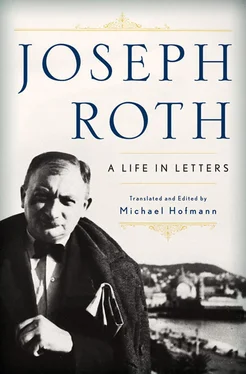Michael Hofmann has translated over fifty works of German prose (from authors including Thomas Bernhard, Bertolt Brecht, Elias Canetti, Hans Fallada, Gert Hofmann, Franz Kafka, Irmgard Keun, Ernst Jünger, Herta Müller, Wolfgang Koeppen, and Wim Wenders). The present volume is his tenth translation from Joseph Roth, whom he first translated in 1988; he won the PEN/Book-of-the-Month Club Prize for The Tale of the 1002nd Night in 1998 and the Helen and Kurt Wolff Translator’s Prize for Rebellion in 2000. For other translations he was awarded the International IMPAC Dublin Literary Award and the Oxford-Weidenfeld Translation Prize (twice). He is a Foreign Member of the American Academy of Arts and Sciences, and of the Deutsche Akademie für Sprache und Dichtung.
Joseph Roth was born Moses Joseph Roth to Jewish parents on 2 September 1894, in Brody in Galicia, in the extreme east of the then Habsburg Empire; he died on 27 May 1939, in Paris. He never saw his father — who disappeared before he was born and later died insane — but grew up with his mother and her relatives. After completing school in Brody, he matriculated at the University of Lemberg (variously Lvov or Lviv), before transferring to the University of Vienna in 1914. He served for a year or two with the Austro-Hungarian Army on the eastern front — though possibly only as an army journalist or censor. Later he was to write, “My strongest experience was the War and the destruction of my fatherland, the only one I ever had, the Dual Monarchy of Austria-Hungary.”
In 1918 he returned to Vienna, where he began writing for left-wing papers, occasionally as “Red Roth,” “ der rote Roth.” In 1920 he moved to Berlin, and in 1923 he began his distinguished association with the Frankfurter Zeitung . In the following years he traveled throughout Europe, filing copy for the Frankfurter from the south of France, the USSR, Albania, Germany, Poland, and Italy. He was one of the most distinguished and best-paid journalists of the period — being paid at the dream rate of one deutsche mark per line. Some of his pieces were collected under the title of one of them, The Panopticum on Sunday (1928) , while some of his reportage from the Soviet Union went into The Wandering Jews . His gifts of style and perception could, on occasion, overwhelm his subjects, but he was a journalist of singular compassion. He observed and warned of the rising Nazi scene in Germany (Hitler actually appears by name in Roth’s first novel, in 1923), and his 1926 visit to the USSR disabused him of most — but not quite all — of his sympathy for Communism.
When the Nazis took power in Germany in 1933, Roth immediately severed all his ties with the country. He lived in Paris — where he had been based for some years — but also in Amsterdam, Ostend, and the south of France, and wrote for émigré publications. His royalist politics were mainly a mask for his pessimism; his last article was called “Goethe’s Oak at Buchenwald.” His final years were difficult; he moved from hotel to hotel, drinking heavily, worried about money and the future. What precipitated his final collapse was hearing the news that the playwright Ernst Toller had hanged himself in New York. An invitation from the American PEN Club (the organization that had brought Thomas Mann and many others to the States) was found among Roth’s papers. It is tantalizing but ultimately impossible to imagine him taking a ship to the New World, and continuing to live and to write: His world was the old one, and he’d used it all up.
Roth’s fiction came into being alongside his journalism, and in the same way: at café tables, at odd hours and all hours, peripatetically, chaotically, charmedly. His first novel, The Spider’s Web , was published in installments in 1923. There followed Hotel Savoy and Rebellion (both 1924), hard-hitting books about contemporary society and politics; then Flight Without End, Zipper and His Father , and Right and Left (all Heimkebrerromane —novels about soldiers returning home after war). Job (1930) was his first book to draw considerably on his Jewish past in the East. The Radetzky March (1932) has the biggest scope of all his books and is commonly reckoned his masterpiece. There follows the books he wrote in exile, books with a stronger fabulist streak in them, full of melancholy beauty: Tarabas, The Hundred Days, Confession of a Murderer, Weights and Measures, The Emperor’s Tomb , and The Tale of the 1002nd Night .












